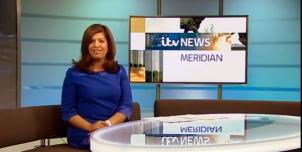Full Freeview on the Oxford (Oxfordshire, England) transmitter
| Google Streetview | Google map | Bing map | Google Earth | 51.790,-1.179 or 51°47'25"N 1°10'46"W | OX3 9SS |
The symbol shows the location of the Oxford (Oxfordshire, England) transmitter which serves 410,000 homes. The bright green areas shown where the signal from this transmitter is strong, dark green areas are poorer signals. Those parts shown in yellow may have interference on the same frequency from other masts.
_______
Digital television services are broadcast on a multiplexes (or Mux) where many stations occupy a single broadcast frequency, as shown below.
64QAM 8K 3/4 27.1Mb/s DVB-T MPEG2
DTG-12 QSPK 8K 3/4 8.0Mb/s DVB-T MPEG2
H/V: aerial position (horizontal or vertical)
Which Freeview channels does the Oxford transmitter broadcast?
If you have any kind of Freeview fault, follow this Freeview reset procedure first.Digital television services are broadcast on a multiplexes (or Mux) where many stations occupy a single broadcast frequency, as shown below.
64QAM 8K 3/4 27.1Mb/s DVB-T MPEG2
DTG-12 QSPK 8K 3/4 8.0Mb/s DVB-T MPEG2
H/V: aerial position (horizontal or vertical)
Which BBC and ITV regional news can I watch from the Oxford transmitter?

BBC South (Oxford) Today 0.4m homes 1.6%
from Oxford OX2 7DW, 6km west-southwest (258°)
to BBC South (Oxford) region - 6 masts.
BBC South (Oxford) Today shares 50% content with Southampton service

ITV Meridian News 0.9m homes 3.4%
from Whiteley PO15 7AD, 102km south (182°)
to ITV Meridian/Central (Thames Valley) region - 15 masts.
Thames Valley opt-out from Meridian (South). All of lunch, weekend and 50% evening news is shared with all of Meridian+Oxford
How will the Oxford (Oxfordshire, England) transmission frequencies change over time?
| 1950s-80s | 1984-97 | 1997-98 | 1998-2011 | 2011-13 | 2013-18 | 2013-17 | 23 May 2018 | ||
| VHF | C/D E | C/D E | C/D E | C/D E | C/D E T | W T | W T | ||
| C2 | BBCtvwaves | ||||||||
| C29 | SDN | ||||||||
| C31 | com7 | com7 | |||||||
| C37 | com8 | com8 | |||||||
| C41 | BBCA | ||||||||
| C44 | D3+4 | ||||||||
| C46 | _local | ||||||||
| C47 | BBCB | ||||||||
| C49tv_off | C5waves | C5waves | |||||||
| C50tv_off | SDN | SDN | |||||||
| C51tv_off | LOX | LOX | |||||||
| C53tv_off | C4waves | C4waves | C4waves | +BBCA | +BBCA | +BBCA | |||
| C55tv_off | ArqB | ArqB | ArqB | com7tv_off | |||||
| C56tv_off | COM8tv_off | ||||||||
| C57tv_off | BBC1waves | BBC1waves | BBC1waves | BBCB | BBCB | BBCB | |||
| C59tv_off | -ArqA | -ArqA | -ArqA | ||||||
| C60tv_off | ITVwaves | ITVwaves | ITVwaves | -D3+4 | -D3+4 | -D3+4 | |||
| C62 | SDN | ||||||||
| C63 | BBC2waves | BBC2waves | BBC2waves |
tv_off Being removed from Freeview (for 5G use) after November 2020 / June 2022 - more
Table shows multiplexes names see this article;
green background for transmission frequencies
Notes: + and - denote 166kHz offset; aerial group are shown as A B C/D E K W T
waves denotes analogue; digital switchover was 14 Sep 11 and 28 Sep 11.
How do the old analogue and currrent digital signal levels compare?
| Analogue 1-4 | 500kW | |
| BBCA, D3+4, BBCB | (-7dB) 100kW | |
| SDN, ARQA, ARQB | (-10dB) 50kW | |
| Analogue 5 | (-11dB) 40kW | |
| com8 | (-14.7dB) 17.1kW | |
| com7 | (-14.8dB) 16.4kW | |
| Mux 1*, Mux 2*, LOX | (-17dB) 10kW | |
| Mux C*, Mux D* | (-18dB) 8kW | |
| Mux A*, Mux B* | (-19.2dB) 6kW |
Which companies have run the Channel 3 services in the Oxford transmitter area
|
|
Sunday, 22 April 2012
Robert: I don't think so.
The reason that I suggest unplugging the aerial lead for part of the scan is because the automatic tuning process may produce to "wrong" results, i.e. the set of channels that the receiver decides to use as the "main" ones are not those from the transmitter to which the aerial faces.
The first thing that is done during automatic tuning is to scan frequencies from low to high and see what's available. Having done this, the receiver needs to decide (where duplicates are found) which ones to use as the main ones. The rest are usually put in the 800s. It is the process by which the decision is made that can vary between receivers and hence the outcome of what any one device may choose to be the "main" set may vary to that of another device on the same aerial.
Having chosen "wrong" channels, the user is then watching a transmission broadcast from a transmitter other than the one which the aerial faces. So it's not surprising if poor reception does ensue. It is therefore necessary to, somehow, get the device tuned to the correct channels. The same issue could occur in the days of analogue with automatic tuning.
Where the wrong channels that the receiver decides to go with are outside of the range of those used by the desired transmitter, then a simple way around the problem is to unplug the aerial so the device never gets to "see" them during its scan.
If you click the Digital UK (DUK) Tradeview link next to your posting, it will bring up the DUK prediction for transmitters you may be able to receive. You say that you have some services by 30% of the scan. The scan runs from channels 21 to 69, so you can convert to percentage and vice versa. At 30% it has completed looking in the 20s and there is apparently one transmitter in that range which is Chiseldon.
Looking at the predictor for your location, if you do the unplugging aerial trick, then the channels used for Mendip are interleaved within those of Oxford.
What I would say is that it is perhaps good practice to check that the main channels are the desired ones. Refer to "After switchover configuration":
Freeview multiplexes | ukfree.tv - independent free digital TV advice
Check the signal strength screen whilst on one of the services from each group (multiplex). Ensure that the UHF channel given is that of the desired transmitter and not another one.
As you have already done this, and confirmed it is channel 62, then this would appear not to be the issue (at least for this particular multiplex).
| link to this comment |
J
jb383:42 PM
Robert: Could I request that the next time channel Ch62 drops out or indeed any of your other channels, that rather than immediately re-tuning the device in question just carry out a signal / quality level test on the blank screen, as the chances are that the signal will still be there but hovering at a level that's just under the reception threshold of your receiver, which of course results in the blank screen.
The reason I ask is that it would be interesting to know what this level is when compared to normal operation, as for satisfactory reception the "normal" would have to be considerably higher or the picture / audio would suffer from frequent intermittent glitching during the fluctuations in signal levels that occurs throughout a 24 hour period when dealing with any signals received from non line-of-site transmitters at reasonable distances away, in your case Oxford being at 27 miles and with Mendip being at 46 miles, although the latter falls well behind Oxford as far as reception predictions are concerned.
Just out of interest, what brand / model of device is the item in question? and does this particular problem also affect any other devices that might possibly use the same aerial system?
| link to this comment |
S
Stephen7:03 PM
Yeah, I figured we were probably picking it up from another aerial, but we're getting 60% strength and 100% quality and a rock solid picture, so I'm tempted to leave it as it is at the moment.
Last time, I did a factory reset and then a manual tune of channel, which picked everything up from Oxford.
Anybody know why 62 is cutting out?
| link to this comment |
Monday, 23 April 2012
P
Paul8:27 AM
Robert
Sunday 22 April 2012 6:40AM
"You say all the Oxford channels are 60% in yet I get at least 21 about 30% in"
Those are not from Oxford, that's why they're weak at your location.
| link to this comment |
Stephen my question also.
jb38 I have a signal strength meter do I just plug it in the aerial input or output.
My unit is Thompson recording system. The problem also occurs on another set with a built in decoder.
| link to this comment |
J
John Cook10:19 AM
On first change over to digital from Rowridge transmitter every thing was fine and all channels had high signal strength.
For the last three days I have had low or no signal for five channels. Retuning does not pick up the channels or picks them up with low signal strength. A broken up picture appears and the the screen goes blank with a heading " Channel not tuned.
Digital UK tell me the reason is due to work being carried out on the transmitter and they only get progress reports once a week they do not know when the work will be completed. They also advise not to retune whilst the work is being carried out for fear of losing channels.
How will we know when it is safe to retune ?
| link to this comment |
John Cook: The answer to your question is that you won't which is why they advised you not to retune!
You started off with one problem; picture break-up or no signal. Now you have two potential problems: picture break-up/no signal and the set not being tuned.
Digital UK publishes engineering works at www.digitaluk.co.uk/engineeringworks
Rowridge digital TV is currently "liable to interruption".
If you have a manual tune option, then try using it. Refer to the Rowridge page for details of UHF channel numbers.
| link to this comment |
K
Keith4:43 PM
I have recently lost the entire C62 (802.0MHz) multiplex on the Oxford transmitter (from Friday 20th April).
That means ITV3, ITV2+1, 5*, 5USA, Quest, The Zone, Channel5+1, CITV (plus others) are all showing NO or BAD SIGNAL.
They are still down today (Monday 23rd April).
| link to this comment |
R
robert7:17 PM
Join the club, mine has been coming and going at the same time of night for several months. I will have my monitor to see signal strength tonight.
| link to this comment |
M
Martyn Johnson8:23 PM
Not receiving ITV, Ch4, nor Ch5 since 1500hrs today, 23 April. All other Freeviews are OK.
| link to this comment |
Select more comments
Your comment please!





